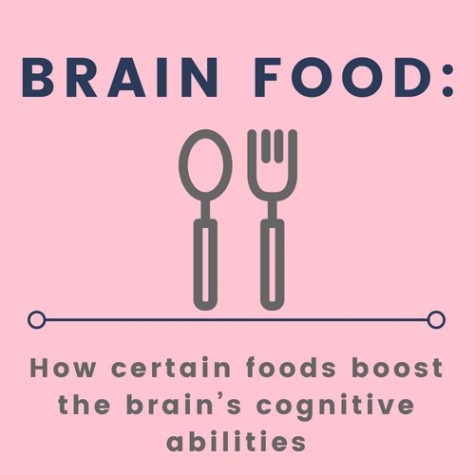
We all know that eating certain kinds of food is beneficial for your body’s health, but did you know that there are certain foods that are good for your brain’s health too? These “brain foods” provide nutritional support to ensure a healthy brain so your chances at acing that big exam increase each time you snack on them.
When it comes to the brain, fat is good. As an organ that is made up of 60 percent fat, specific types of fats are essential in keeping your brain in its best shape. Omega-3 fatty acids, which can be found in fatty fish or some types of nuts, do so much for our bodies, yet we can’t naturally produce them, so we have to find other ways to incorporate them into our diets.
“Omega-3 fatty acids are very important for protecting the brain,” Trevor Selvage, a UNF nutrition and dietetics student, said. “Fatty fish like salmon, or seeds like chia seed and flaxseed, will have them. But omega-3 fatty acids aren’t as bio-available, so that means you’re not able to digest all of them sometimes. So, the more you eat, the more likely they’ll be absorbed.”
Another substance that is necessary for a healthy mind and body are antioxidants. Antioxidants are important in that they help keep our bodies balanced from an overabundance of pro-oxidants, which are also essential. If you take vitamins every day, you’re getting antioxidants into your body. Too much pro-oxidants can lead to oxidative stress.
Without this balance, oxidative stress sets in and this can lead to cell death. Factors that lead to oxidative stress include cigarette smoke, alcohol consumption and air pollution, just to name a few.
“Think of an oxidant as being toxic, and it’s depriving your cells of oxygen. But too many antioxidants can be bad, you can start to overload and make certain things cease function so it’s all about balance,” Junior Nutrition and Dietetics Major Emerald Casto explained.
“If something is listed as anti-inflammatory, usually means it’s also an antioxidant. Fresh ginger, turmeric, most fruits and vegetables: these are all antioxidants,” Casto explained.
Antioxidants and Omega-3 fatty acids help increase memory function, can ease depression and even help slow down age-related mental decline.
You probably already ingest a lot of things on a daily basis that are considered antioxidants or have omega-3 fatty acids. You may not have even been aware of it! So, if any of the foods listed are in your current diet, you’re off to a good start in maintaining a healthy brain and memory for the remainder of the semester!
—
For more information or news tips, or if you see an error in this story or have any compliments or concerns, contact editor@unfspinnaker.com.
















James | Sep 4, 2018 at 4:25 am
Great article! My favourite brain foods are matcha green tea, guarana and choline. They all work so well, and you can even get them (as well as lots of other nice ingredients) in BrainZyme supplements. https://www.brainzyme.com/